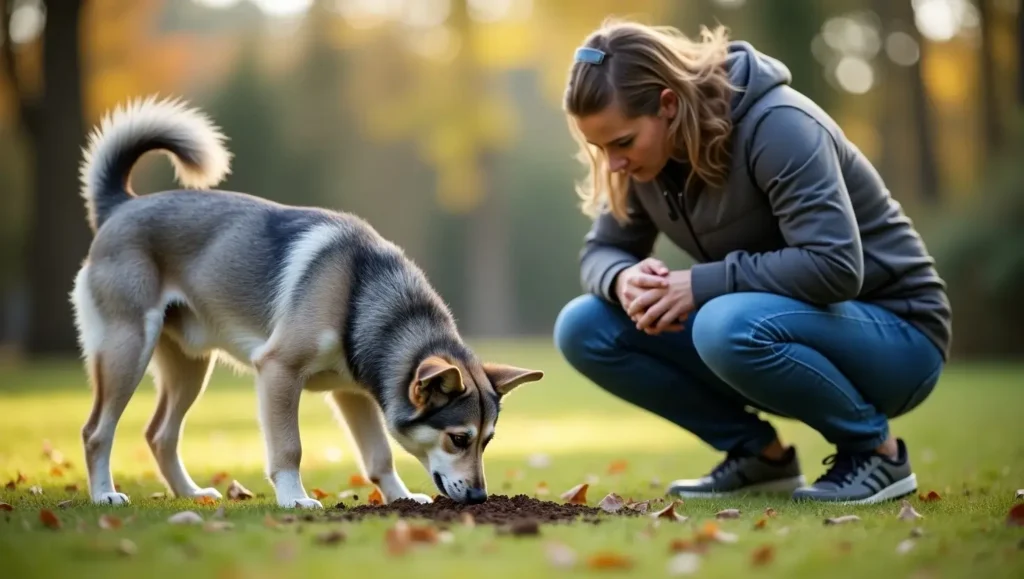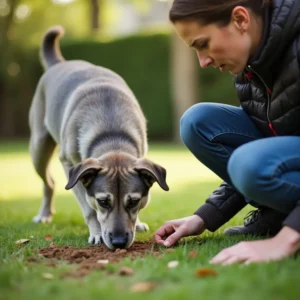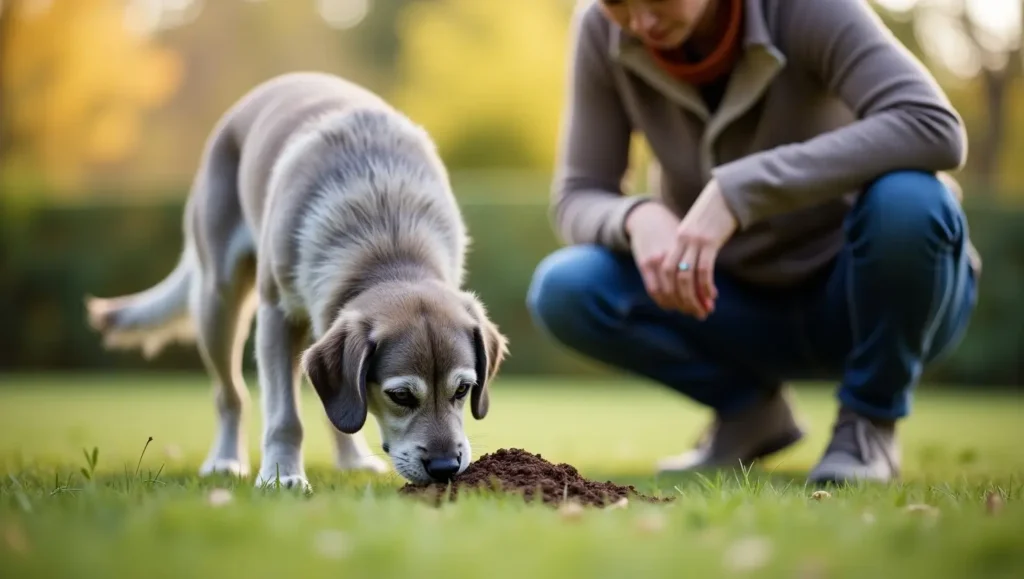At WhizPet, we understand how concerning it can be when you notice unusual behaviors in your furry companion. That’s why we conducted in-depth research to help you answer the question: why is my senior dog eating dirt? Our team analyzed veterinary insights, pet owner experiences, and scientific studies to uncover the key reasons behind this behavior. We know that aging dogs can develop new habits, but when it comes to dirt eating, it could signal an underlying issue.
So, why is my senior dog eating dirt? Is it due to a nutritional deficiency, an upset stomach, or something more serious? Through our research, we’ve found that this habit can stem from medical, behavioral, or dietary reasons. Understanding the root cause is essential to keeping your senior dog healthy and happy.
If you’ve been wondering, why is my senior dog eating dirt?, don’t worry—we’ve got you covered. Read on to discover five alarming reasons for this behavior and practical solutions to help your beloved pet.

1. Nutritional Deficiencies: Is Your Dog Lacking Essential Nutrients?
One of the most common reasons why your senior dog is eating dirt is a nutritional deficiency. As dogs age, their bodies may struggle to absorb essential vitamins and minerals, leading them to seek alternative sources—like soil.
Possible Deficiencies That Lead to Dirt Eating:
- Iron Deficiency (Anemia): Low iron levels can make dogs crave non-food substances.
- Calcium Deficiency: Some older dogs instinctively eat dirt to supplement their calcium intake.
- Other Mineral Deficiencies: Magnesium, zinc, and phosphorus imbalances can also trigger this behavior.
What You Can Do:
- Consult a veterinarian to check for deficiencies.
- Switch to a high-quality senior dog food with balanced nutrients.
- Consider adding vet-approved supplements to their diet.
2. Gastrointestinal Issues: Is Your Dog Trying to Soothe an Upset Stomach?
Another reason why your senior dog is eating dirt could be an underlying digestive issue. Dogs instinctively consume soil to alleviate discomfort in their stomachs.
Common Digestive Problems in Senior Dogs:
- Gastritis or Acid Reflux: Eating dirt may neutralize stomach acids.
- Inflammatory Bowel Disease (IBD): This can lead to unusual cravings.
- Parasites: Intestinal worms can cause cravings for non-food items.
Signs to Watch For:
- Why is my senior dog eating dirt and vomiting? Vomiting may indicate gastritis or a more serious issue.
- Diarrhea or constipation.
- Loss of appetite or weight loss.
How to Help:
- Schedule a vet visit for a gastrointestinal health checkup.
- Feed a gentle diet like boiled chicken and rice.
- Provide probiotics to support gut health.
3. Cognitive Dysfunction: Is Your Dog Showing Signs of Canine Dementia?
As dogs age, they may develop Canine Cognitive Dysfunction Syndrome (CCDS), which affects their behavior, memory, and decision-making. Eating dirt can be one of the symptoms of cognitive decline.
Signs of Cognitive Dysfunction:
- Confusion or disorientation.
- Increased anxiety or restlessness.
- Changes in sleep patterns.
- Repeating unusual behaviors, like eating dirt.
Ways to Support Cognitive Health:
- Provide brain-stimulating toys and puzzles.
- Stick to a consistent daily routine.
- Consider omega-3 supplements for brain health.
- Consult your vet about medications to slow cognitive decline.
4. Behavioral Issues: Is It Stress, Anxiety, or Boredom?
Senior dogs may turn to dirt-eating as a coping mechanism for stress, anxiety, or boredom. This behavior is similar to dogs chewing on furniture or excessively licking their paws.
Common Triggers for Anxiety-Related Dirt Eating:
- Lack of physical activity.
- Separation anxiety.
- Recent changes in the household.
What You Can Do:
- Increase playtime and walks to keep them engaged.
- Use calming aids like anxiety vests or pheromone diffusers.
- Provide safe chew toys to redirect the behavior.
5. Underlying Medical Conditions: Could It Be a More Serious Issue?
If your senior dog is suddenly eating dirt, it could indicate an underlying medical problem. Certain diseases can cause cravings for non-food items (a condition called pica).
Possible Medical Causes:
- Liver disease.
- Kidney disease.
- Diabetes.
- Cushing’s disease.
Signs to Watch For:
- Why is my senior dog eating dirt and drinking lots of water? Excessive thirst can indicate kidney disease or diabetes.
- Sudden weight loss or lethargy.
- Changes in appetite or urination habits.
Next Steps:
- Book a comprehensive blood test with your vet.
- Monitor other changes in behavior or appetite.
- Follow the vet’s recommendations for treatment.
How to Prevent Your Dog from Eating Dirt
If you’re wondering how to stop a dog from eating soil, here are some effective strategies:
- Ensure Proper Nutrition: Feed a well-balanced, high-quality senior dog diet.
- Keep Your Dog Hydrated: Dehydration can sometimes cause cravings for dirt.
- Provide Mental Stimulation: Keep your senior dog engaged with interactive toys.
- Limit Access to Soil: Supervise outdoor time and remove tempting areas.
- Regular Vet Checkups: Rule out any underlying health issues.

FAQs About Senior Dogs Eating Dirt
1. Why is my senior dog eating dirt all of a sudden?
Sudden dirt-eating can indicate a new deficiency, medical issue, or behavioral change. It’s best to consult a vet if this behavior appears unexpectedly.
2. What is a dog lacking when it eats dirt?
Most often, a dog is lacking iron, calcium, or other essential minerals. However, digestive issues and behavioral problems can also contribute.
3. Why is my elderly dog eating soil and vomiting?
Vomiting along with dirt-eating can indicate an upset stomach, digestive disorder, or even poisoning from contaminated soil. Seek veterinary advice immediately.
4. Is it dangerous if my senior dog eats dirt?
Yes, eating dirt can expose dogs to harmful bacteria, pesticides, or parasites. Long-term ingestion may also cause blockages in the digestive system.
5. How can I stop my senior dog from eating dirt?
Address the root cause—whether it’s nutrition, anxiety, or a medical issue. Provide a balanced diet, mental stimulation, and regular vet checkups.
Final Thoughts: Should You Be Concerned?
If you’ve been asking, “Why is my senior dog eating dirt?”Now you have a better understanding of the potential causes. While some reasons may be harmless, others could indicate a serious health issue. The best approach is to observe your dog’s behavior, take preventive measures, and consult a vet if the problem persists.
Take action now. Book a vet appointment if your dog is showing signs of illness, and switch to a nutrient-rich diet to prevent deficiencies. Your senior dog deserves the best care in their golden years.
Need expert pet advice? Subscribe to our newsletter for more senior dog health tips.
Related blog: For more detailed information about pet care

